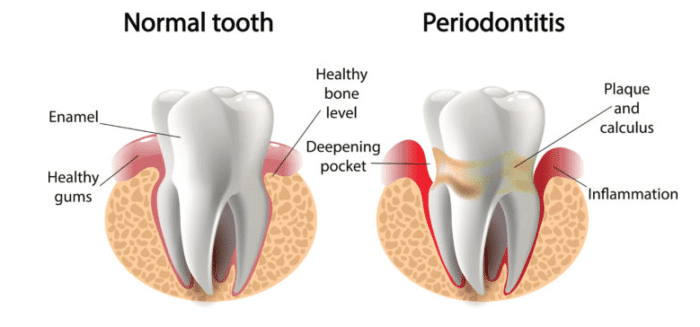If you are experiencing bleeding gums while brushing or flossing, schedule a comprehensive exam today!
Bleeding gums are commonly an indicator of gum disease. Gum or periodontal disease is a progressive bacterial infection that compromises the integrity and stability of a patient’s overall dental health. Your gums serve as a support structure for your teeth and play a role in your well being.
Bleeding gums can pose a risk to your healthy teeth by creating ways of infection to grab hold. Gums that regularly bleed when you brush can cause plaque buildup and tooth loss if left untreated.
Why Do My Gums Bleed?
Bleeding gums can be caused by a couple of oral issues. Just because you have bleeding gums does not mean you have developed periodontal disease. Although, you are at a higher risk of getting the disease if you have had the symptom for a long period of time. Fortunately, you have your Ottawa ON dentist at Villanova Dental Studio that can properly diagnose and treat the disease.
Common reasons for bleeding gums (other than periodontal disease) include:
Brushing too hard: You may be brushing too hard or using a hard bristled toothbrush that is causing micro lacerations on your gums. Try switching to a soft toothbrush and make a conscious effort to brush lightly.
Medication symptoms: Your medications may be causing your gums to bleed. Ask your prescribing doctor about them. Maybe you can get switched to a medication that does not induce this symptom.
Unhealthy diet: The foods you eat can have a big impact on your oral health. Try cutting down on unhealthy foods, snack foods, and sugary drinks. See a nutritionist if you do not know how to change your diet.
Keeping your gums healthy is an important part of maintaining long-term dental health. At Villanova Dental Studio we emphasize the importance of patient education for the prevention of gum disease and offer comprehensive treatment plans to restore oral health.

Periodontal disease can show little to no warning signs until the disease has entered the later stages of development. Patients may believe that their smiles are healthy when they are not. Visiting the dentist regularly can help allow for early diagnosis of gum disease. Early diagnosis can prevent further deterioration of the gums and teeth and may reduce the need for advanced restorative dental procedures.
Left untreated, gum disease can cause a whole range of complications. Gum disease is a leading cause of tooth loss and receding gums. Gum disease not only deteriorates a patient’s oral health but can have systemic health consequences as well. Gum disease has been linked to an increased rate of diabetes, cardiovascular disease, inflammation, and Alzheimer’s disease.
Treatment For Bleeding Gums
We offer a full range of periodontal treatments to help manage the progression of gum disease. During a comprehensive dental exam, we will use the Florida Probe System® to digitally scan your gums for any signs of gum disease. Based on the results, we will develop a personalized plan to help restore your smile. Depending on the stage and severity of gum disease, we may suggest any of these comprehensive treatment options:
- Perio Protect®
- Laser Assisted Periodontal Therapy (LAPT)
- Scaling & Root Planing
- Surgery to Reduce Pockets
- Bone or soft tissue grafting
Bleeding Gums FAQs
Is bad breath an early symptom of gum disease?
Bad breath can be known to be an early stage of gum disease. Bad breath alone is not a large concern as being directly linked to gum disease in the future, but if bad breath is appearing alongside other symptoms of gum disease it may be a good idea to schedule an appointment with your dentist. If bad breath is persistent with efforts to get rid of it with brushing and mouthwash, it is never a bad idea to discuss concern with your dentist.
What Causes Gum Disease?
Gum disease can be caused by a variety of things. Some cannot be controlled such as genetic predisposition, age, and other health conditions. Others can be controlled and limited such as smoking, tobacco use, diet, and poor oral hygiene. It is important to do your best to take care of your teeth and gums, because they can affect your overall health in your future.
What does salt water rinse do to irritated gums?
Rinsing with saltwater helps soothe irritated gums. It is recommended that patients use warm water and 1 teaspoon of salt. The salt removes infection from the gums, and the warm water helps aid with any inflation and redness in the gums.


 1261 Stittsville Main Street, Unit #9
1261 Stittsville Main Street, Unit #9
 1261 Stittsville Main Street
1261 Stittsville Main Street


